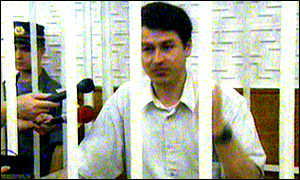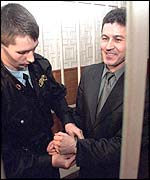|
23rd January 2003
BBC NEWS
Pasko exposed nuclear dumping at sea
A journalist imprisoned for treason after
disclosing how Russia dumped nuclear
waste in the Pacific Ocean has been released
on parole.
Grigory Pasko, a former naval officer, was
sentenced to four years in jail in December 2001.
After his release for good behaviour, Pasko said his campaign was not over.
“Grigory Pasko will be able to return home in the next couple of days,” said Maria Stebnovskaya, judge
"We are going to work to achieve the full exoneration of my good name," he said outside the prison.
"We're going to do everything to ensure that this criminal case is recognised as a falsification, that is, the way it is in fact."
In June 2002, the Russian Supreme Court rejected an appeal against Pasko's conviction.
Pasko's lawyer, Ivan Pavlov, said his client would serve the remaining 16 months of his sentence at home, under police surveillance, the French news agency AFP reported.
Announcing the ruling, Ussuryisk court judge Maria Stebnovskaya said: "Grigory Pasko will be able to return home in the next couple of days.
"This is how long it will take to file all necessary documents."
Under Russian law, a prisoner who has served two-thirds of his sentence and behaved well can apply for release.
"The court made its decision [to release Pasko] mainly because our client had never once violated the jail's rules and regulations," Mr Pavlov told reporters after the hearing.
Whistle-blower
Pasko was arrested by the Russian security service in 1997, while working as a journalist for the Russian Pacific Fleet's newspaper.
He was investigated after writing a story about how the fleet dumped nuclear waste at sea.
At his first trial in July 1999, Pasko was convicted only of abuse of
office and given a three-year sentence.
He was immediately set free under a prisoner amnesty.
Pasko appealed to the military section of Russia's Supreme Court
to clear his name entirely, but the court said he should be retried
on the espionage and treason charges.
|

